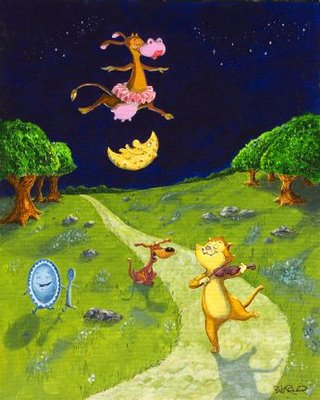Ok, I just got done blogging about originality for my 300 blog but it pertains just as much to this class too - especially since we are forbidden to use the word in 304.

Everyone knows the Hey Diddle Diddle nursery rhyme, which brings me to what our creative writing professor Greg Keeler had published in "Outside Bozeman."
His poem goes: 'The cat, the fiddle, the cow, / the moon, the dog, the dish / and the spoon - they all made / some weird kind of sense when / I was a kid. So did the frog and / the princess - all that stuff. But / when I neared adulthood, it all / went poof. If I wanted to site a / cow doing the moon thing, I had / to lie on my back in the dirt at / the rodeo on a full-moon night, / and even in that posture, I had / to be whacked on Jack Daniels / and pretend the bull was a cow. / The rest always seemed to fall / into place. Some cat played / fiddle on the p.a. while my little / gal laughed like a dog. The cop / who cuffed me was fat as a / platter and dragged me away as / a looney tune. It wasn't a stretch / to imagine myself as a spoon.' -Greg Keeler, in Outside Bozeman
And there you have evidence why nothing is original, or is it? Yes, Keeler definitely got his material from the nursery rhyme, but by variating it's presentation, in a way he has created something original through imitation. As the author Northrop Frye writes in our text for 300, Anatomy of Criticism, on page 97, "But any serious study of literature soon shows that the real difference between the original and the imitative poet is simply that the former is profoundly imitative." Also, by imitating or referencing something that's happened the audience is already more engaged, either by interest of knowledge or the subject. With a larger audience a poet's reputation grows too, whether good or bad the poet is influential.
But look again at Keeler's poem and you'll notice the even more important connection. And that is with the loss of innocence after childhood, "My Book and Heart Shall Never Part," and children's literature. He writes, 'The cat, the fiddle, the cow, / the moon, the dog, the dish / and the spoon - they all made / some weird kind of sense when / I was a kid. So did the frog and / the princess - all that stuff. But / when I neared adulthood, it all / went poof.' When he was a kid, all this nonsense made sense: a dog laughing at a cat playing the fiddle while a cow jumps the moon and a dish and a spoon run off to elope for eternity; the frog and the princess; all this diddle diddle makes sense to children. It's fun, exciting, silly, and most of all entertaining.
Yet when you 'near adulthood, it all goes poof.' Why? And why do kids, once they've tasted experience, yearn for it more. Sure the reason, 'it feels good' works, but it's cliche, and so boring and useless now. Besides, along with experience we get more hassles, stress, worry, and fear; all that for the periodic pleasure experience presents. Why do kids want to loose their innocence a-sap? Probably because being innocent means you don't know how good you have it and so you ruin it, because we get curiouser and curiouser. As humans it seems we're doomed for troubles and hassles no matter what we do - it must be that 'awful shadow of some unseen power, floating though unseen amongst us' (Percy Shelley).
